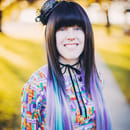Two years ago, I called it a hookup. Six months later, it was a “non-consensual encounter.” Now, finally, I know to call it sexual assault.
I was 18 years old when I told my mother that I planned to attend CU Boulder. She told me not to; she’d read online that sexual assault was an epidemic on large college campuses. I told her she was paranoid.
Then a man from my dorm forced himself down my throat, willfully ignoring my tears. I refused to let myself feel vulnerable. I became angry with him, and ashamed of my own choices that led me to that night. I told my friends he was a loser, but I couldn’t bring myself to tell them why.
He was part of the dorm staff. With his bright orange hair and easy charisma, he was a permanent fixture at the front desk. I began memorizing his work schedule to avoid confronting him by any means necessary. I pretended that I enjoyed getting to class an hour early on Thursdays because I needed to be out the door before he arrived for his morning shift.
My friends teased me over and over for what they assumed was simply an awkward sexual experience. Finally, I could no longer let them keep rehashing it. With a shaky breath, I told the friend teasing me that I hadn’t consented. She immediately softened.
“I’ve been there. Let me know if you ever need to talk about it. I’m sorry,” she said.
Even then, I couldn’t let myself be seen as a victim. I was fine. I was an adult. Worse things have happened, I told myself. I could move on from this just like any other bad experience. I certainly didn’t want to come forward. Why should I ruin his life over this? This was my own problem. I preferred this silent agony to the possibility that I would become the girl who cried rape.
A month later, my dorm had a mandatory screening of The Hunting Ground. I began to shake. I couldn’t look at the screen while the movie played. I stared at the ground, ashamed. In class, my professors spoke about definitions of consent and rape. Still, I couldn’t bring myself to come forward.
I continued to live like this for the next two years. I ignored the way that my body trembled when people around me discussed rape. I worshipped the lovers that asked me if I consented, and then when they inevitably discarded me I was freshly wrecked by the humiliation. I decided I would only ever be good enough for one night of “fun” before things would fall through.
I plunged into a depression that I thought I would never see the end of. I allowed myself to become an empty shell as I continued to ignore my trauma.
Slowly, inexplicably, things began to change. I left the man I was dating because he tactlessly cheated on me. I threw myself back into my schoolwork. I started emerging from my empty shell that wasn’t so empty after all.
A year and a half later, my social media illuminated with the words “Me Too.”
Women of all professions and statures spoke up about their experiences with sexual assault and harassment; the magnitude of posts was staggering.
Better yet, I saw the men accused of these heinous acts facing real consequences. These men were all powerful and charismatic, seemingly beyond reproach. They all acted with the assumption that they would never be caught. They all believed that they deserved to act in this manner.
Suddenly, I could see cracks appearing in their world of safe untouchability. The parallels between their victims’ stories and my own were undeniable. For the first time since that night two Octobers ago, I had hope that he might not win after all.
See more about our open submissions if you’d like to share your own story.


